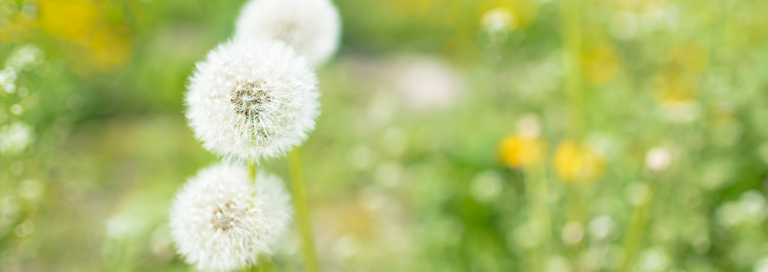Sadly, conventional medical doctors don’t recognize the value of medicinal herbs.
But when something has been documented to heal for thousands of years, it’s more than proven its worth.
Archeological studies have proven that the practice of herbal medicine dates as far back as 60,000 years ago…1 I’m proud to keep this tradition moving forward.
In the early days of my medical practice, I developed some highly therapeutic and medicinal herbal remedies in an apothecary’s garden I kept behind the building.
I called it my “healing garden.” I would grind the plants and extract myself to treat my patients with homegrown herbal formulas.
Some of my most popular herbal remedies contained Taraxacum officinale – better known as the dandelion.
The word dandelion is an English corruption of the French name for the plant – “dent de lion,” which means “lion’s tooth,” and refers to the tooth-like serrations on the leaves.
But these herbaceous perennials are not just annoying weeds in your yard.
You see, the humble dandelion promises to be a potent cancer killer.
Researchers at two Canadian universities – Windsor and Ottawa – found evidence that dandelion root is also a powerful crusader against various cancers – including gastric, skin, pancreatic, prostate, and leukemia.
The studies reveal that dandelion root extract affects cancer proliferation by targeting proteins that promote cancer cell growth and migration, causing the cancer cells to die.2,3,4
The studies also showed dandelion root extract can reduce the drug resistance of cancer cells.
While the research is highly promising, all studies were conducted on animal subjects or with isolated cancer cells in laboratory Petri dishes.
Human research is the next step. But if results are anything like we’ve seen in the past, I expect these results to be just as promising.
For centuries, dandelion root was used to treat
dozens of ailments, including digestive disorders, arthritis, anemia, and depression.Today’s research backs up what ancient healers instinctively knew. In fact, studies show…
-
- Bioactive compounds in dandelion root can lower LDL (bad) cholesterol levels and dramatically lower the risk of heart disease.5
- The plant contains two compounds, chicoric and chlorogenic acid, that improve insulin sensitivity and lower blood sugar levels in people with diabetes.6
- Dandelion extract can significantly reduce inflammatory markers. In one study of mice with lung disease, those treated with dandelion had considerably less inflammation.7
- Its leaves act as a natural diuretic and contain high levels of potassium, making it ideal for treating high blood pressure.
- The plant’s bright yellow flower contains potent antioxidant properties that counteract the chronic inflammation that leads to cellular damage, accelerated aging, and chronic diseases.
Get Dandelion’s Healing Benefits From A Delicious Tea
I recommend making your own strong decoction from dried dandelion roots. It’s as easy as it is healthy. The result is a delicious dark brown tea that tastes almost like roasted chocolate.
-
- Place a couple of handfuls of clean roots in a roasting pan. Bake at 250 for two hours, turning over after an hour to heat both sides. Once cool, chop finely or grind in a coffee grinder.
- Add the root powder to a tea infuser—place it in a pot of cool water. Use the lowest setting on your stove to maintain heat for several hours for the maximum medicinal value.
- Remove from heat and enjoy.
Dandelion root supplements are also available. Choose one that is organic and non-GMO.
Note: Be careful about using dandelions if you don’t know where they came from. Gardeners often use crabgrass and dandelion killers like Weed-B-Gone, Weedone, Miracle, Demise, Lawn-Keep, and Raid Weed Killer, all of which contain chlorophenol, a notorious carcinogen.
To Your Good Health,

Al Sears, MD, CNS
References:
1. Leroi Gourhan A. “The flowers found with Shanidar IV, a Neanderthal burial in Iraq.” Science. 1975;190(4214):562–564.
2. Yu-Cheng Li, et al. “Antidepressant effects of the water extract from Taraxacum officinale leaves and roots in mice.” Pharm Biol. 2014;52:8:1028-1032.
3. Chatterjee J, et al. “The efficacy of dandelion root extract in inducing apoptosis in drug-resistant human melanoma cells.” Evid Based Complement Alternat Med. 2011; 2011: 129045.
4. Nguyen C, et al. “Dandelion root and lemongrass extracts induce apoptosis, enhance chemotherapeutic efficacy, and reduce tumour xenograft growth in vivo in prostate cancer.” Evid Based Complement Alternat Med. 2019; 2951428.
5. Choi UK, et al. “Hypolipidemic and antioxidant effects of dandelion (Taraxacum officinale) root and leaf on cholesterol-fed rabbits.” J Mol Sci. 2010 Jan; 11(1): 67–78.
6. Ferrare K, et al. “Increase in insulin sensitivity by the association of chicoric acid and chlorogenic acid contained in a natural chicoric acid extract (NCRAE) of chicory (Cichorium intybus L.) for an antidiabetic effect.” J Ethnopharmacol. 2018 Apr 6;215:241-248.
7. Ma C, et al. “Anti-inflammatory effects of water extract of Taraxacum mongolicum hand.-Mazz on lipopolysaccharide-induced inflammation in acute lung injury by suppressing PI3K/Akt/mTOR signaling pathway.” J Ethnopharmacol. 2015 Jun 20;168:349-55.

